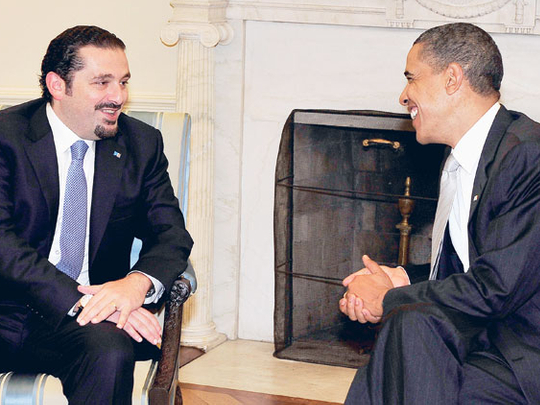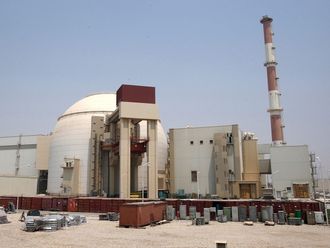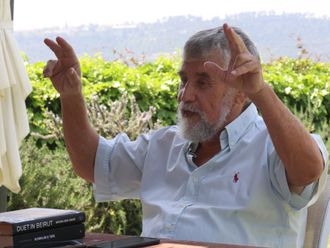
Damascus: While Lebanese Prime Minister Sa'ad Hariri was making world headlines at the White House, where he met US President Barack Obama on Monday, Lebanese President Michel Sulaiman was speaking to Al Manar TV back home — the official Hezbollah channel — praising the Lebanese resistance on the 10th anniversary of liberation of South Lebanon.
The May 2000 liberation of the South, he said, "was the brightest chapter in Lebanon's history", claiming that "resistance is the only way to regain usurped rights!"
At first glance, the Lebanese President and his premier seem to be sending contradicting signals to the world, about being a pro-Western nation or one strongly protective of Hezbollah.
The truth is somewhere in between: Lebanon being all of the above, all at once. Sulaiman after all, came to power in 2008 thanks to the strong backing of Hezbollah while Hariri made it to the top in 2009 after hammering out an alliance with the Lebanese resistance, granting them two portfolios in his cabinet, giving them the veto power, and penning a cabinet policy statement that promised to "protect and embrace" the arms of Hezbollah.
While Sulaiman — the symbol of the state — was showering Hezbollah with praise, Hariri was busy trying to elicit US support to prevent a new war along the Lebanese-Israeli border, which many analysts, predict will be sometime in the summer of 2010.
White House spokesman Robert Gibbs said that the Hariri-Obama meeting — their first since the former became prime minister in 2009 — discussed "a broad range of mutual goals in support of Lebanon's sovereignty and independence".
Hariri spoke briefly to reporters after the meeting — which started out as a one-on-one and was then expanded to include five Lebanese ministers (including Hezbollah's ally from the Amal movement Foreign Minister Ali Al Shami) — saying that he came to the US "to protect Lebanon and cement its stability".
Jeffrey Feltman, an ex-ambassador to Lebanon, who currently serves as Secretary of State for Near East Affairs, also met with Hariri, who then had a one-on-one with Defence Minister Elias Al Murr, while Vice-President Joseph Biden spoke to Hariri by telephone.
Topics on the agenda of the Hariri-Obama meeting included worry over Israeli threats to strike against Hezbollah, Israeli claims that Syria is transferring long-range Scud missiles to Lebanon, and Lebanon's stance over the forthcoming vote for a fourth set of sanctions on Iran (given that Lebanon is now seated as a non-permanent member of the UN Security Council).
Hariri reportedly stressed three issues. One was to provide Lebanon with an international umbrella to protect it from any upcoming war with Israel, making it loud and clear that his country does not want war and cannot afford it.
Coinciding with this umbrella, he noted, was a dire need to jumpstart peace talks in the Middle East with US support. Only the Americans can apply real pressure on Israel for sustainable peace, and only peace can bring real stability to Lebanon, he added. Any regional deal, however, must not be at the expense of Lebanon.
Third on Harriri's agenda was a request for technical and military assistance to the Lebanese Army.












